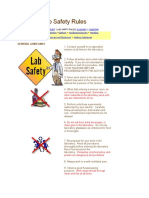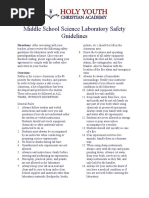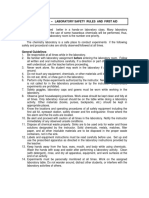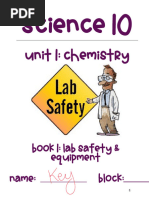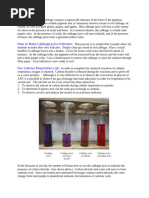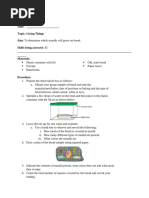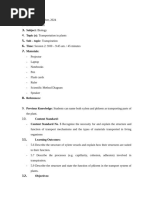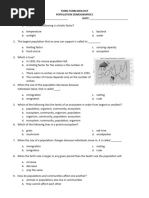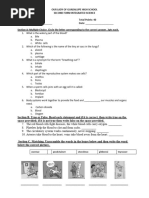lab safety rules
lab safety rules
Uploaded by
Melva GuerraCopyright:
Available Formats
lab safety rules
lab safety rules
Uploaded by
Melva GuerraCopyright
Available Formats
Share this document
Did you find this document useful?
Is this content inappropriate?
Copyright:
Available Formats
lab safety rules
lab safety rules
Uploaded by
Melva GuerraCopyright:
Available Formats
Lab Safety Rules
HOME | SAFETY CONTRACT | LAB SAFETY RULES| GLOSSARY | CALENDAR
LAB SAFETY RULES - General Guidelines >Clothing > Accidents & Injuries > Handling Chemicals >
Handling Glassware and Equipment > Heating Substances
GENERAL GUIDELINES
1. Conduct yourself in a responsible manner at all times in the
laboratory.
2. Follow all written and verbal instructions carefully. If you do
not understand a direction or part of a procedure, ASK YOUR
TEACHER BEFORE PROCEEDING WITH THE ACTIVITY.
3. Never work alone in the laboratory. No student may work in
the science classroom without the presence of the teacher.
4. When first entering a science room, do not touch any
equipment, chemicals, or other materials in the laboratory area
until you are instructed to do so.
5. Perform only those experiments authorized by your teacher.
Carefully follow all instructions, both written and oral.
Unauthorized experiments are not allowed.
6. Do not eat food, drink beverages, or chew gum in the
laboratory. Do not use laboratory glassware as containers for
food or beverages.
7. Be prepared for your work in the laboratory. Read all
procedures thoroughly before entering the laboratory. Never
fool around in the laboratory. Horseplay, practical jokes, and
pranks are dangerous and prohibited.
8. Always work in a well-ventilated area.
9. Observe good housekeeping practices. Work areas should
be kept clean and tidy at all times.
10. Be alert and proceed with caution at all times in the
laboratory. Notify the teacher immediately of any unsafe
conditions you observe.
11. Dispose of all chemical waste properly. Never mix
chemicals in sink drains. Sinks are to be used only for water.
Check with your teacher for disposal of chemicals and
solutions.
12. Labels and equipment instructions must be read carefully
before use. Set up and use the equipment as directed by your
teacher.
13. Keep hands away from face, eyes, mouth, and body while
using chemicals or lab equipment. Wash your hands with soap
and water after performing all experiments.
14. Experiments must be personally monitored at all times. Do
not wander around the room, distract other students, startle
other students or interfere with the laboratory experiments of
others.
15. Know the locations and operating procedures of all safety
equipment including: first aid kit(s), and fire extinguisher. Know
where the fire alarm and the exits are located.
16. Know what to do if there is a fire drill during a laboratory
period; containers must be closed, and any electrical equipment
turned off.
Top
CLOTHING
17. Any time chemicals, heat, or glassware are used, students
will wear safety goggles. NO EXCEPTIONS TO THIS RULE!
18. Contact lenses may be not be worn in the laboratory.
19. Dress properly during a laboratory activity. Long hair,
dangling jewelry, and loose or baggy clothing are a hazard in the
laboratory. Long hair must be tied back, and dangling jewelry
and baggy clothing must be secured. Shoes must completely
cover the foot. No sandals allowed on lab days.
20. A lab coat or smock should be worn during laboratory
experiments.
Top
ACCIDENTS AND INJURIES
21. Report any accident (spill, breakage, etc.) or injury (cut,
burn, etc.) to the teacher immediately, no matter how trivial it
seems. Do not panic.
22. If you or your lab partner is hurt, immediately (and loudly)
yell out the teacher's name to get the teacher's attention. Do not
panic.
23. If a chemical should splash in your eye(s) or on your skin,
immediately flush with running water for at least 20
minutes. Immediately (and loudly) yell out the teacher's name to
get the teacher's attention.
Top
HANDLING CHEMICALS
24. All chemicals in the laboratory are to be considered
dangerous. Avoid handling chemicals with fingers. Always use a
tweezer. When making an observation, keep at least 1 foot
away from the specimen. Do not taste, or smell any chemicals.
25. Check the label on all chemical bottles twice before
removing any of the contents. Take only as much chemical as
you need.
26. Never return unused chemicals to their original container.
27. Never remove chemicals or other materials from the
laboratory area.
Top
HANDLING GLASSWARE AND
EQUIPMENT 28. Never handle broken glass with your bare hands. Use a
brush and dustpan to clean up broken glass. Place broken
glass in the designated glass disposal container.
29. Examine glassware before each use. Never use chipped,
cracked, or dirty glassware.
30. If you do not understand how to use a piece of
equipment,ASK THE TEACHER FOR HELP!
31. Do not immerse hot glassware in cold water. The glassware
may shatter.
Top
HEATING SUBSTANCES
32. Do not operate a hot plate by yourself. Take care that hair,
clothing, and hands are a safe distance from the hot plate at all
times. Use of hot plate is only allowed in the presence of the
teacher.
33. Heated glassware remain very hot for a long time. They
should be set aside in a designated place to cool, and picked up
with caution. Use tongs or heat protective gloves if necessary.
34. Never look into a container that is being heated.
35. Do not place hot apparatus directly on the laboratory desk.
Always use an insulated pad. Allow plenty of time for hot
apparatus to cool before touching it.
Top
You might also like
- Aprilynne Pike - Wings #2 - SpellsDocument214 pagesAprilynne Pike - Wings #2 - SpellsJohnmoiNo ratings yet
- Squid Game Logic ScriptDocument21 pagesSquid Game Logic ScriptUzziah's WorldNo ratings yet
- ACFrOgDyo25KajqguZRWM9gLBqgupGef6HdHCB06fquG6tkAcsmISOoryHJNAYG Ybb7vnR-Xwk2e JkGDS05m-NyqnPkM1JWn2Uhj0zXZqO1IW2Nru Otf9HvHzWE9HMRqD4Z0WoEvP6WTOcPgTDocument2 pagesACFrOgDyo25KajqguZRWM9gLBqgupGef6HdHCB06fquG6tkAcsmISOoryHJNAYG Ybb7vnR-Xwk2e JkGDS05m-NyqnPkM1JWn2Uhj0zXZqO1IW2Nru Otf9HvHzWE9HMRqD4Z0WoEvP6WTOcPgTArmanie Guzman-DircioNo ratings yet
- Practical Guide Biology 1Document83 pagesPractical Guide Biology 1Siyabonga MasukuNo ratings yet
- Lab Safety RulesDocument10 pagesLab Safety Rulesrhomelyn malanaNo ratings yet
- Lab Safety RulesDocument2 pagesLab Safety Rulesazuresaphire01No ratings yet
- Sfhs Safety AcknowledgementDocument2 pagesSfhs Safety Acknowledgementapi-356101386No ratings yet
- Chem+0 1+Student+Safety+ContractDocument2 pagesChem+0 1+Student+Safety+Contractjosephhuelskamp469No ratings yet
- Laboratory Safety ContractDocument6 pagesLaboratory Safety Contractwebster gloriagmcNo ratings yet
- Activity NoDocument9 pagesActivity NoVincent DayangcoNo ratings yet
- ololstudent_saftey_contractDocument4 pagesololstudent_saftey_contractChristine Oloroso PaulinoNo ratings yet
- Lab and Safety Rules and The MicroscopeDocument18 pagesLab and Safety Rules and The Microscopebensonwachila9No ratings yet
- Biology Safety Contract 1 1Document4 pagesBiology Safety Contract 1 1Isaac HongNo ratings yet
- Activity No. 1 - Laboratory Safety and Preventive MeasuresDocument3 pagesActivity No. 1 - Laboratory Safety and Preventive MeasuresVincent DayangcoNo ratings yet
- Middle School Science Laboratory Safety GuidelinesDocument3 pagesMiddle School Science Laboratory Safety Guidelinesapi-277480617No ratings yet
- Introductory Handout Package - Grade 11 IbDocument40 pagesIntroductory Handout Package - Grade 11 Ibasmaarsalan756No ratings yet
- 41 Commandments Inside The ScilabDocument3 pages41 Commandments Inside The ScilabAlexie AlmohallasNo ratings yet
- Safety Rules ContractDocument4 pagesSafety Rules Contractapi-293174360No ratings yet
- LAB SafetyDocument4 pagesLAB SafetyEesha DaveNo ratings yet
- Science Safety ContractDocument14 pagesScience Safety ContractBrian MurtaghNo ratings yet
- Science Lab RulesDocument6 pagesScience Lab RulesMalati PalanisamyNo ratings yet
- Flinn Safety ContractDocument2 pagesFlinn Safety Contractapi-262405485No ratings yet
- 01 Gen Chem Safety and Laboratory RulesDocument3 pages01 Gen Chem Safety and Laboratory RulesElla CaparasNo ratings yet
- Safety ContractDocument2 pagesSafety Contractapi-236865387No ratings yet
- Student Lab Safety Contract: PurposeDocument3 pagesStudent Lab Safety Contract: Purposeapi-342311816No ratings yet
- Flinn Scientific LAB Safety ContractDocument2 pagesFlinn Scientific LAB Safety Contractusmurali2238No ratings yet
- 0-1-Lab Safety ContractDocument2 pages0-1-Lab Safety ContractIvy Rose PanganodNo ratings yet
- Kami Exporr afety Contract Science OPRF (1)Document3 pagesKami Exporr afety Contract Science OPRF (1)zvaldez01No ratings yet
- FLMS Safety Rules For LabDocument3 pagesFLMS Safety Rules For LabKeyara KnightsNo ratings yet
- Physics Student Safety ContractDocument3 pagesPhysics Student Safety ContractJdeen FajardoNo ratings yet
- PDF - Lab Rules - ChsDocument2 pagesPDF - Lab Rules - Chsapi-205313794No ratings yet
- Lab Safety RulesDocument6 pagesLab Safety RulesnettextsNo ratings yet
- Labrules 1Document1 pageLabrules 1charbel Abou MarounNo ratings yet
- Laboratory Safety RulesDocument4 pagesLaboratory Safety RulesnyxNo ratings yet
- Expt 1 Lab Safety and Equipment SEDocument12 pagesExpt 1 Lab Safety and Equipment SEFrance AldaveNo ratings yet
- CHEM 503 Lab Manual-2024Document85 pagesCHEM 503 Lab Manual-2024Hussain RazaNo ratings yet
- 4-Appendix Laboratory Safety Contract (Microbiology)Document4 pages4-Appendix Laboratory Safety Contract (Microbiology)dhayanithy.2107No ratings yet
- Lab Safety ContractDocument2 pagesLab Safety Contractlovesara2345.5No ratings yet
- Lab Safety RulesDocument2 pagesLab Safety RulesforeverjoyfulNo ratings yet
- Biology Lab Safety Contract: Their Copy. Please Read The Entire Contract Before You Sign. Students Will Not Be AllowedDocument4 pagesBiology Lab Safety Contract: Their Copy. Please Read The Entire Contract Before You Sign. Students Will Not Be Allowedapi-297284721No ratings yet
- LABORATORY GUIDELINESDocument12 pagesLABORATORY GUIDELINEStjbalagtas8No ratings yet
- Chemistry Lab Rules General SafetyDocument2 pagesChemistry Lab Rules General Safetypilar0218No ratings yet
- Week 1 - Laboratory Safety and PrecautionsDocument29 pagesWeek 1 - Laboratory Safety and PrecautionsCzarina Bea SaberonNo ratings yet
- Scientific Method Lab 1Document25 pagesScientific Method Lab 1hubercoelloNo ratings yet
- Laboratory Safety RulesDocument3 pagesLaboratory Safety RulesHyudgeNo ratings yet
- General Laboratory PrecautionsDocument4 pagesGeneral Laboratory PrecautionsMishal KhanNo ratings yet
- 2020-2021 Safety in The Chemistry Laboratory RulesDocument6 pages2020-2021 Safety in The Chemistry Laboratory RulesAnthony MerleNo ratings yet
- Lab Safety RulesDocument3 pagesLab Safety Rulesnoel0880lopezNo ratings yet
- Activity #1 Lab (Chemistry)Document4 pagesActivity #1 Lab (Chemistry)ELLAYNE JOY TANNo ratings yet
- 1 Intro Lab Safety Condensed Student Booklet KeyDocument20 pages1 Intro Lab Safety Condensed Student Booklet Keycowgirl.2011No ratings yet
- Ms and Hs CCSD Science Safety ContractDocument3 pagesMs and Hs CCSD Science Safety Contractapi-291870326No ratings yet
- Lab Safety Poster Project Student AssignmentsDocument4 pagesLab Safety Poster Project Student AssignmentsErica CameronNo ratings yet
- Lab Safety RulesDocument4 pagesLab Safety Rulessumayahafeez474No ratings yet
- Chemistry Lab Safety Rules - 270622Document31 pagesChemistry Lab Safety Rules - 270622Dhayan KomanthakkalNo ratings yet
- Practical For StudentsDocument50 pagesPractical For StudentsA HNo ratings yet
- Safety ContractDocument3 pagesSafety Contractapi-199066238No ratings yet
- Lab Manual 2016 (Analytical and Organic Chemistry)Document30 pagesLab Manual 2016 (Analytical and Organic Chemistry)Arif HilmiNo ratings yet
- Laboratory Safety Rules and GuidelinesDocument4 pagesLaboratory Safety Rules and GuidelinesAileene MontenegroNo ratings yet
- Pengurusan Makmal Sains 7Document12 pagesPengurusan Makmal Sains 7namlyNo ratings yet
- Lessons in Science Safety with Max Axiom Super Scientist: 4D An Augmented Reading Science ExperienceFrom EverandLessons in Science Safety with Max Axiom Super Scientist: 4D An Augmented Reading Science ExperienceRating: 4 out of 5 stars4/5 (1)
- Mad Professor: Concoct Extremely Weird Science Projects—Robot Food, Saucer Slime, Martian Volcanoes, and MoreFrom EverandMad Professor: Concoct Extremely Weird Science Projects—Robot Food, Saucer Slime, Martian Volcanoes, and MoreRating: 4 out of 5 stars4/5 (1)
- Lab_03__Ecology_GameDocument3 pagesLab_03__Ecology_GameMelva GuerraNo ratings yet
- Lab_Safety_Crossword_Puzzle_Pg_2Document1 pageLab_Safety_Crossword_Puzzle_Pg_2Melva GuerraNo ratings yet
- 261_labs_digestionDocument8 pages261_labs_digestionMelva GuerraNo ratings yet
- Lab_05__Sensory_SystemsDocument10 pagesLab_05__Sensory_SystemsMelva GuerraNo ratings yet
- safety brochureDocument48 pagessafety brochureMelva GuerraNo ratings yet
- 3.1.4 Leaf Yeast ProcedureDocument17 pages3.1.4 Leaf Yeast ProcedureMelva GuerraNo ratings yet
- 12.02__ProcedureDocument1 page12.02__ProcedureMelva GuerraNo ratings yet
- Enzyme Activity and EggsDocument5 pagesEnzyme Activity and EggsMelva GuerraNo ratings yet
- Monohybrid_ProblemDocument3 pagesMonohybrid_ProblemMelva GuerraNo ratings yet
- Lab_13__ReproductionDocument6 pagesLab_13__ReproductionMelva GuerraNo ratings yet
- DC11010 (1)Document8 pagesDC11010 (1)Melva GuerraNo ratings yet
- Investigation_ Drosophila SimulationDocument5 pagesInvestigation_ Drosophila SimulationMelva GuerraNo ratings yet
- Respiration labDocument2 pagesRespiration labMelva GuerraNo ratings yet
- Evolution and Natural SelectionDocument6 pagesEvolution and Natural SelectionMelva GuerraNo ratings yet
- Genetics and Probability sectionedDocument6 pagesGenetics and Probability sectionedMelva GuerraNo ratings yet
- Building Self EsteemDocument6 pagesBuilding Self EsteemMelva GuerraNo ratings yet
- Bread Mold labDocument4 pagesBread Mold labMelva GuerraNo ratings yet
- Sciencepreneurship phase gradesDocument3 pagesSciencepreneurship phase gradesMelva GuerraNo ratings yet
- Graphing Analysis AssignmentDocument1 pageGraphing Analysis AssignmentMelva GuerraNo ratings yet
- Pepsin lab eggsDocument5 pagesPepsin lab eggsMelva GuerraNo ratings yet
- Punnet_Square_PracticeDocument2 pagesPunnet_Square_PracticeMelva GuerraNo ratings yet
- 4thBiologyLP_Transport_in_plants L1Document12 pages4thBiologyLP_Transport_in_plants L1Melva GuerraNo ratings yet
- Cells quizDocument2 pagesCells quizMelva GuerraNo ratings yet
- 3RD Bio WorksheetDocument3 pages3RD Bio WorksheetMelva GuerraNo ratings yet
- Graphing ChecklistDocument1 pageGraphing ChecklistMelva GuerraNo ratings yet
- InfoLit Digital Literacy WorksheetDocument3 pagesInfoLit Digital Literacy WorksheetMelva GuerraNo ratings yet
- Excretory Notes HSBDocument6 pagesExcretory Notes HSBMelva GuerraNo ratings yet
- ElementsDocument3 pagesElementsMelva GuerraNo ratings yet
- CH Series N Parallel WorksheetDocument2 pagesCH Series N Parallel WorksheetMelva GuerraNo ratings yet
- Organ System TestDocument2 pagesOrgan System TestMelva GuerraNo ratings yet
- MR Ms Intrams GuidelinesDocument1 pageMR Ms Intrams GuidelinesSannie MiguelNo ratings yet
- LK Ricy Sept 2021Document29 pagesLK Ricy Sept 2021acepmuhammadihsan97No ratings yet
- Bosch GWS 10-125 ManualDocument16 pagesBosch GWS 10-125 ManualAlberto CapchaNo ratings yet
- Exodus - Survivor's Guide Texas Guide v1.0Document56 pagesExodus - Survivor's Guide Texas Guide v1.0Bastone100% (3)
- SAR Medals and Order of PrecedenceDocument17 pagesSAR Medals and Order of PrecedenceAlan SeeNo ratings yet
- Love Syndrome (Nan-Mac) #Love Syndrome@BlglnovelsDocument435 pagesLove Syndrome (Nan-Mac) #Love Syndrome@Blglnovelsbookstagramanisha100% (1)
- Sense and ReferenceDocument8 pagesSense and ReferenceMuhd Faisal SamsudinNo ratings yet
- Ripped For The Pleasure ENGDocument2 pagesRipped For The Pleasure ENGJill KrahlingNo ratings yet
- Camp-Invitation-Letter 2023Document2 pagesCamp-Invitation-Letter 2023Cj AlbiolaNo ratings yet
- AWARDSDocument9 pagesAWARDSebitjovsNo ratings yet
- Final Exam Revision - Fce1Document43 pagesFinal Exam Revision - Fce1Talla Arriazu ElgueaNo ratings yet
- Q1 Mod4 TLE10Document17 pagesQ1 Mod4 TLE10DAPHNEE MAE AGUDONGNo ratings yet
- English - Grade 1 - THUY DUONG 4Document8 pagesEnglish - Grade 1 - THUY DUONG 404Trần Ngọc Ánh12A8No ratings yet
- Carte Masina Cusut Pfaff 230-260-332Document58 pagesCarte Masina Cusut Pfaff 230-260-332Cristina Andronescu100% (2)
- Berroco Artesia: Designed by The Berroco Design Team / Skill Level: IntermediateDocument4 pagesBerroco Artesia: Designed by The Berroco Design Team / Skill Level: IntermediateStephanie WatsonNo ratings yet
- Adjectives, Nouns, Verbs,: and Other Parts of Speech By: Miss FidahDocument9 pagesAdjectives, Nouns, Verbs,: and Other Parts of Speech By: Miss FidahUliya AlfiNo ratings yet
- De Thi HK1 Da NangDocument2 pagesDe Thi HK1 Da NangTrần Thanh Tùng THPT Nguyễn Việt DũngNo ratings yet
- Strategic Analysis of Nike Inc.: Term III Report OnDocument31 pagesStrategic Analysis of Nike Inc.: Term III Report OnSURABHI SUSHREE NAYAKNo ratings yet
- Test 1 Exam Practice Reading and Writing Part 1: Ii NH IticfDocument11 pagesTest 1 Exam Practice Reading and Writing Part 1: Ii NH IticfThinn Thiri HtetNo ratings yet
- FINAL REPORT 2K19 DesertDocument56 pagesFINAL REPORT 2K19 DesertPawan NegiNo ratings yet
- south-east-cork-service-area_2021_12_07Document10 pagessouth-east-cork-service-area_2021_12_07Roj Mac DonaghNo ratings yet
- Persuasive EssayDocument3 pagesPersuasive Essayapi-514534991No ratings yet
- Jolidon Fashion Lingerie Spring Summer 2012Document12 pagesJolidon Fashion Lingerie Spring Summer 2012customerservice8560% (5)
- Practice - Unit 5Document2 pagesPractice - Unit 5Jose Vargas Fuentes0% (1)
- The Grand Lodge of Free and Accepted Masons of Ohio: Officers ManualDocument60 pagesThe Grand Lodge of Free and Accepted Masons of Ohio: Officers ManualMichel Breuer0% (1)
- Operating Room TechniqueDocument36 pagesOperating Room TechniqueAldrin BardeNo ratings yet
- Parts of The Lockstitch Sewing MachineDocument2 pagesParts of The Lockstitch Sewing MachineLiezel Jane Simblante100% (1)
- Title: Best in Production Number: Search For King & Queen of HeartsDocument3 pagesTitle: Best in Production Number: Search For King & Queen of HeartsJayson Pascual EstanesNo ratings yet




